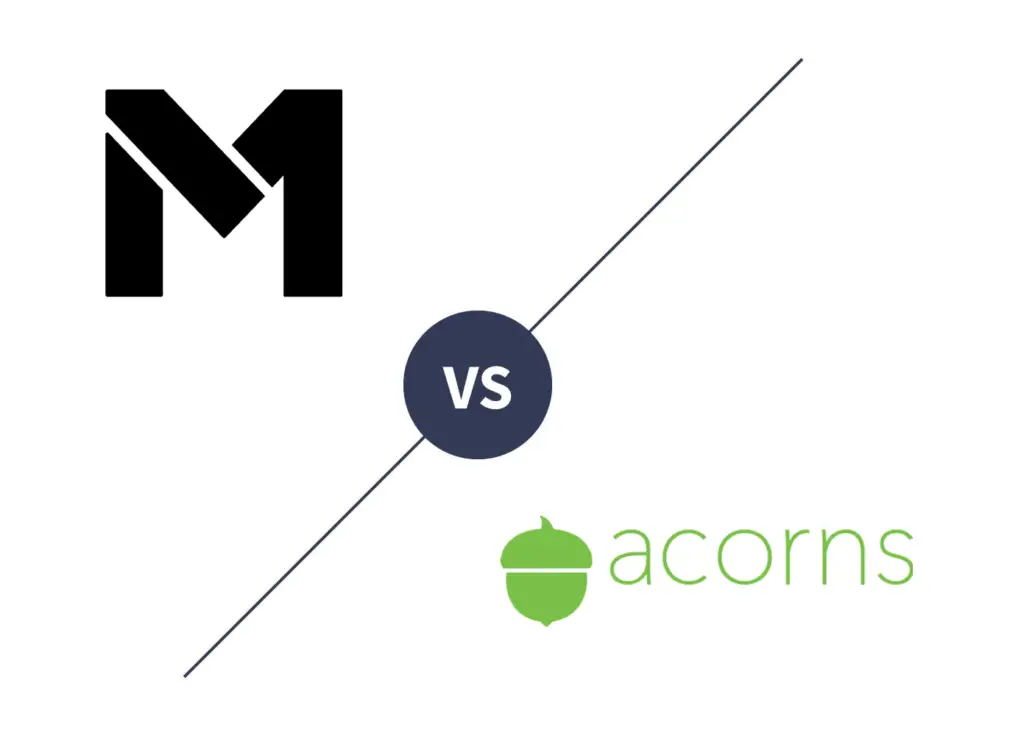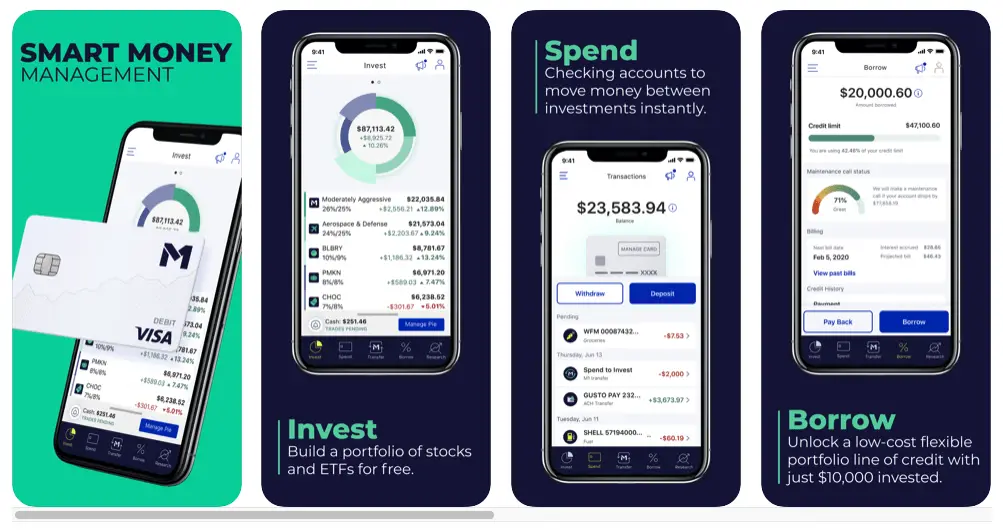
New-age, low-cost, low-effort investment platforms like M1 Finance and Acorns are becoming more popular as investors have wisened up to fees and commissions, as well as higher physical and mental barriers to entry, of traditional brokers. Here we'll compare M1 Finance and Acorns. I wrote a separate comprehensive review of M1 Finance here if you're interested in seeing the specifics of the platform.
Disclosure: Some of the links on this page are referral links. At no additional cost to you, if you choose to make a purchase or sign up for a service after clicking through those links, I may receive a small commission. This allows me to continue producing high-quality content on this site and pays for the occasional cup of coffee. I have first-hand experience with every product or service I recommend, and I recommend them because I genuinely believe they are useful, not because of the commission I may get. Read more here.
M1 Finance vs. Acorns – Summary Comparison
Contents
M1 Finance vs. Acorns – Commissions and Fees
Acorns and M1 Finance both offer commission-free trades. M1 has zero account fees, aside from the obvious miscellaneous fees for things like paper statements, outbound account transfers, inactivity, etc.
Acorns has 3 tiered account levels with different fees and different features:
- All 3 account levels have a taxable investment account called Acorns Invest.
- Their Basic plan at $1/mo. is just a taxable investment account.
- The Plus plan at $2/mo. includes access to retirement accounts – called Acorns Later – in the form of a Traditional IRA, Roth IRA, or SEP IRA.
- The Acorns Premium plan is $3/mo. and adds access to an FDIC-insured checking account called Acorns Spend.
M1 Finance vs. Acorns – Account Types
M1 Finance offers taxable, joint, Traditional IRA, Roth IRA, Rollover IRA, SEP IRA, Trust, and Custodial (M1 Plus members) accounts.
Acorns only offers taxable, Traditional IRA, Roth IRA, and SEP IRA accounts. IRA's are only available with, at minimum, their mid-grade “Plus” plan at $2/mo.
Neither platform offers SIMPLE IRA, 401(k), Solo 401(k), 529, HSA, and Non-Profit accounts.
Both M1 and Acorns also offer an FDIC-insured bank/checking account with debit card. M1's checking account is able to earn interest and cash back, but only if you subscribe to their “M1 Plus” premium membership at $125/year. Acorns offers a form of cash back as what they call Found Money®, through which they've partnered with select stores where when you shop there, cash back goes into your Acorns account to be invested.
M1 Finance vs. Acorns – Investment Products
Acorns is extremely limited in its investment product offerings, and it's designed to be that way. It only offers a choice of 5 pre-built portfolios (Conservative, Moderately Conservative, Moderate, Moderately Aggressive, and Aggressive) comprised of low-cost ETF's. They note that their portfolios were built with the help of Harry Markowitz, the father of modern portfolio theory. I'm personally not a fan of these portfolios' inclusion of small-cap growth stocks and corporate bonds, but that's a separate conversation.
Acorns does not offer individual stocks.
If you don't know what an ETF is (and don't care to know), Acorns allows you to be completely hands-off in your investing. Your spare change and automatic deposits can be automatically invested in your selected portfolio, and automatically rebalanced, without you ever having to think about it. This may be an attractive option for an absolute beginner who knows nothing about investing and who doesn't want to learn.
In contrast, M1 Finance gives you much more control and considerably more options in terms of investment products. M1 offers most ETF's and individual stocks that are traded on major exchanges. Using the pie-based interface, you can construct your portfolio however you'd like.
M1 Finance also offers pre-built “Model Portfolios,” similar to Acorns's portfolios, that you can invest in for free. This makes M1 attractive for both beginner and experienced investors alike.
Neither M1 Finance nor Acorns has futures, options, crypto, or forex.
M1 Finance vs. Acorns – Margin
Acorns does not offer margin.
M1 Finance has great margin rates.
Aside from leveraging your portfolio, M1's margin loan can be used for anything you want – refinancing higher-interest debt, major purchases, unexpected expenses, etc.
M1 Finance vs. Acorns – Mobile App
Both M1 Finance and Acorns have sleek, intuitive, user-friendly, robust mobile apps for both Apple iOS and Android. M1's app looks like this:

Here are some screenshots of Acorns's mobile app:

M1 Finance vs. Acorns – Extra Features
- M1 Finance and Acorns both support fractional shares, meaning you can buy a fraction of a single share of an investment, allowing even small amounts of money to start growing.
- Both M1 and Acorns offer automatic rebalancing, which allocates new deposits to keep your portfolio's holdings on track.
- Both M1 and Acorns support dividend reinvestment, meaning when your investments that pay a dividend, that payment can be reinvested instead of sitting idly as a cash balance.
- M1 brings a social aspect to investing, allowing you to share your Custom Pies via a hyperlink.
M1 Finance vs. Acorns – Summary and Conclusion
- Both M1 Finance and Acorns offer zero-commission trades. M1 doesn't have account fees. Acorns has small monthly account fees that differ based on your needs, ranging from $1/mo. to $3/mo.
- M1 Finance has one more account type than Acorns: Trust accounts. Neither platform offers SIMPLE IRA, 401(k), Solo 401(k), 529, Custodial, HSA, and Non-Profit accounts.
- M1 Finance offers most ETF's and individual stocks. Acorns offers only 5 pre-built portfolios based on your risk tolerance, and does not offer individual stocks. Neither platform offers futures, options, crypto, or forex.
- M1 Finance offers great margin rates. Acorns does not offer margin.
- Both platforms have modern, intuitive desktop web and mobile app interfaces.
- Both platforms offer an FDIC-insured bank account with a debit card. M1's bank account is eligible for cash back and interest with their premium M1 Plus membership. Acorns has their Found Money® program through which you can earn cash back from select partner stores.
- Both M1 Finance and Acorns offer fractional shares, automatic rebalancing, and dividend reinvestment.
- M1 allows you to share your Custom Pies via a hyperlink and invest in the Custom Pies of others, such as these “lazy portfolios.”
Both M1 Finance and Acorns will provide significant savings in fees over other brokers and traditional banks.
Your choice between the two depends entirely on your experience level and how you want to invest. As I noted earlier, Acorns is perfect for people with absolutely zero experience with investing who also don't want to learn anything about investing and prefer to be completely hands-off. This is their target audience.
I actually admire the fact that Acorns has deliberately lowered the physical and mental barriers to investing and saving for retirement. Even their $3/mo. Premium plan is well worth that price in my opinion. Acorns is obviously far too limited for even a semi-experienced investor who wants some semblance of portfolio control.
M1 Finance is great for beginner and sophisticated investors alike, and everyone in between. They offer complete control in the selection of investments, but simultaneously offer pre-built, set-and-forget Model Portfolios or lazy portfolios in which you can invest for free, for beginners who don't want to bother with choosing their own investments. M1 also offers cheap access to margin and individual stocks, which Acorns doesn't have. I wrote a separate comprehensive review of M1 Finance here if you're interested in seeing the specifics of the platform.
Disclaimer: While I love diving into investing-related data and playing around with backtests, this is not financial advice, investing advice, or tax advice. The information on this website is for informational, educational, and entertainment purposes only. Investment products discussed (ETFs, mutual funds, etc.) are for illustrative purposes only. It is not a research report. It is not a recommendation to buy, sell, or otherwise transact in any of the products mentioned. I always attempt to ensure the accuracy of information presented but that accuracy cannot be guaranteed. Do your own due diligence. I mention M1 Finance a lot around here. M1 does not provide investment advice, and this is not an offer or solicitation of an offer, or advice to buy or sell any security, and you are encouraged to consult your personal investment, legal, and tax advisors. Hypothetical examples used, such as historical backtests, do not reflect any specific investments, are for illustrative purposes only, and should not be considered an offer to buy or sell any products. All investing involves risk, including the risk of losing the money you invest. Past performance does not guarantee future results. Opinions are my own and do not represent those of other parties mentioned. Read my lengthier disclaimer here.

Are you nearing or in retirement? Use my link here to get a free holistic financial plan and to take advantage of 25% exclusive savings on financial planning and wealth management services from fiduciary advisors at Retirable to manage your savings, spend smarter, and navigate key decisions.


Leave a Reply